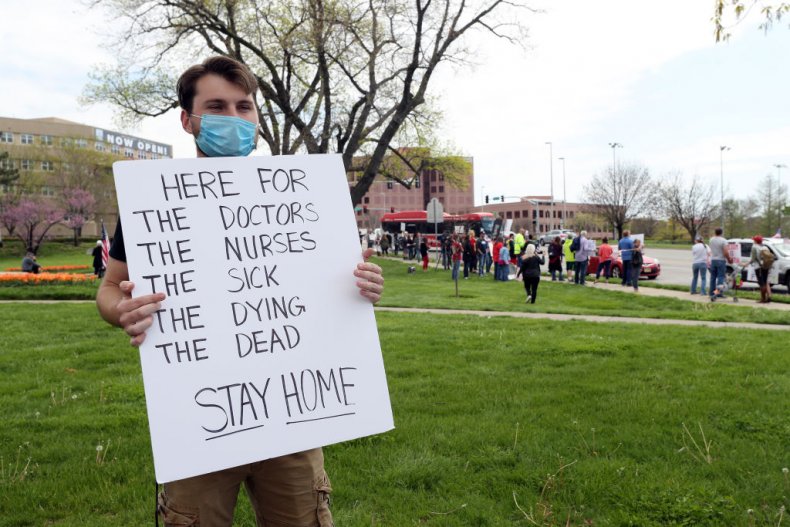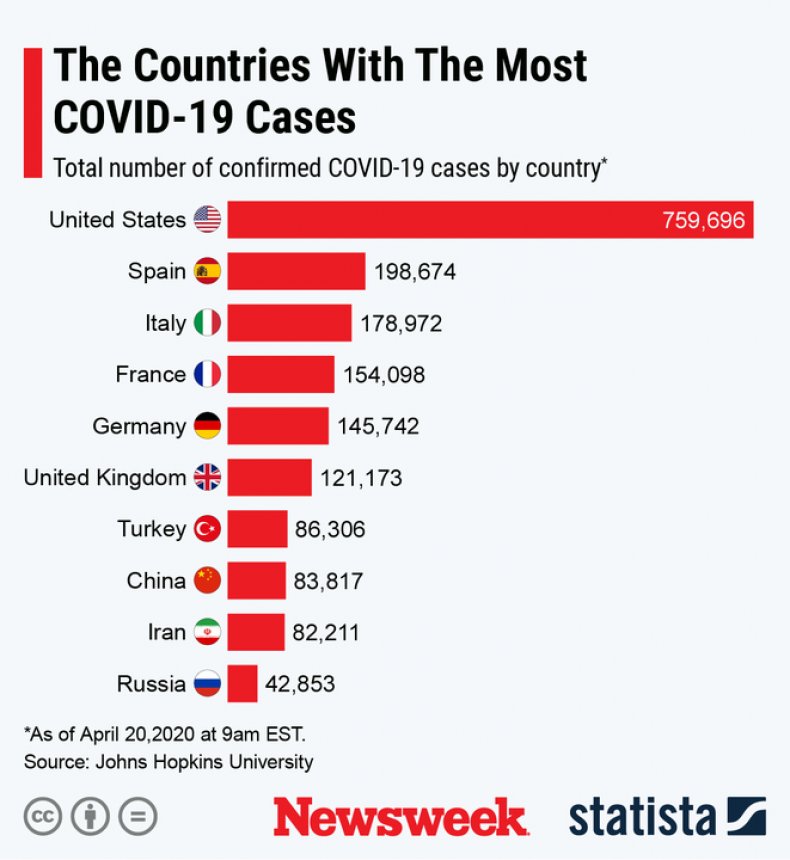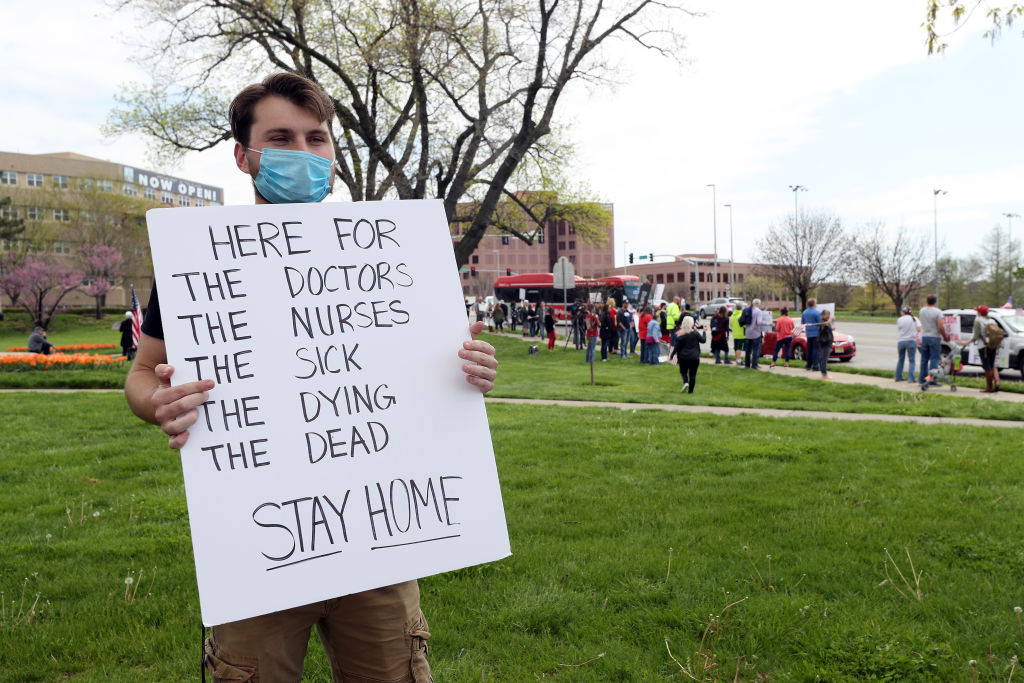Most Americans are opposed to protests against stay-at-home orders and other coronavirus pandemic lockdown measures, according to a new poll.
The latest survey by Yahoo! News and YouGov found that 60 percent of the U.S. public opposed protesters calling for an immediate end to social distancing measures and stay-at-home orders designed to protect public safety.
Less than a quarter of respondents (22 percent) said they supported the rallies calling for America to be “reopened” while a further 18 percent said they were “not sure” how they felt on the matter.
According to Yahoo! News, the majority of Republicans were also found to oppose the anti-lockdown protests that have taken place in several states.
Forty-seven percent of GOP voters told pollsters they rejected the protesters calls while 36 percent supported the rallies.

Jamie Squire/Getty Images
Asked whether they agreed with President Donald Trump’s Friday tweets calling on Americans to “LIBERATE MINNESOTA” and “LIBERATE MICHIGAN” amid pandemic shutdowns, only 26 percent said they did.
A further 42 percent plurality said they disagreed with the commander-in-chief’s remarks as just under a third (32 percent) said they didn’t know what the question was about.
Overall, pollsters found that Americans were cautious about reopening the country’s economy amid the COVID-19 pandemic.
A little more than seven-in-ten (71 percent) said America should reopen when public health authorities can test and trace new COVID-19 cases. The remaining 29 percent said it should be opened as soon as possible to curb economic damage.
U.S. adults were split on the exact same lines when asked if they were more about concerned about restrictions being lifted too quickly (71 percent) or too slowly.
The latest YouGov/Yahoo! News poll was conducted between April 17 and April 19, and surveyed more than 1,500 U.S. adults. Its margin of error stands at 3 percentage points.
Over the weekend, protests against coronavirus lockdown measures such as stay at home orders took place in several states—including Texas, Michigan and Virginia.
At the rallies, protesters spoke of concerns about job losses as they broke social distancing rules and claimed the virus was not as dangerous as authorities have said.
According to Johns Hopkins University’s COVID-19 tracker, more than 759,000 confirmed cases of the novel coronavirus had been recorded in America as of 9 a.m. EST on Monday. At the time of writing, 42,364 coronavirus deaths have also been recorded in America, along with 73,527 cases of total recovery.
The graphic below, provided by Statista, shows the total number of confirmed COVID-19 cases by country.

Statista
Centers for Disease Control and Prevention Advice on Using Face Coverings to Slow Spread of COVID-19
- CDC recommends wearing a cloth face covering in public where social distancing measures are difficult to maintain.
- A simple cloth face covering can help slow the spread of the virus by those infected and by those who do not exhibit symptoms.
- Cloth face coverings can be fashioned from household items. Guides are offered by the CDC. (https://www.cdc.gov/coronavirus/2019-ncov/prevent-getting-sick/diy-cloth-face-coverings.html)
- Cloth face coverings should be washed regularly. A washing machine will suffice.
- Practice safe removal of face coverings by not touching eyes, nose, and mouth, and wash hands immediately after removing the covering.
World Health Organization advice for avoiding spread of coronavirus disease (COVID-19) Hygiene advice
- Clean hands frequently with soap and water, or alcohol-based hand rub.
- Wash hands after coughing or sneezing; when caring for the sick; before, during and after food preparation; before eating; after using the toilet; when hands are visibly dirty; and after handling animals or waste.
- Maintain at least 1 meter (3 feet) distance from anyone who is coughing or sneezing.
- Avoid touching your hands, nose and mouth. Do not spit in public.
- Cover your mouth and nose with a tissue or bent elbow when coughing or sneezing. Discard the tissue immediately and clean your hands.
Medical advice
- Avoid close contact with others if you have any symptoms.
- Stay at home if you feel unwell, even with mild symptoms such as headache and runny nose, to avoid potential spread of the disease to medical facilities and other people.
- If you develop serious symptoms (fever, cough, difficulty breathing) seek medical care early and contact local health authorities in advance.
- Note any recent contact with others and travel details to provide to authorities who can trace and prevent spread of the disease.
- Stay up to date on COVID-19 developments issued by health authorities and follow their guidance.
Mask and glove usage
- Healthy individuals only need to wear a mask if taking care of a sick person.
- Wear a mask if you are coughing or sneezing.
- Masks are effective when used in combination with frequent hand cleaning.
- Do not touch the mask while wearing it. Clean hands if you touch the mask.
- Learn how to properly put on, remove and dispose of masks. Clean hands after disposing of the mask.
- Do not reuse single-use masks.
- Regularly washing bare hands is more effective against catching COVID-19 than wearing rubber gloves.
- The COVID-19 virus can still be picked up on rubber gloves and transmitted by touching your face.






